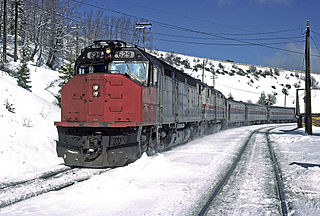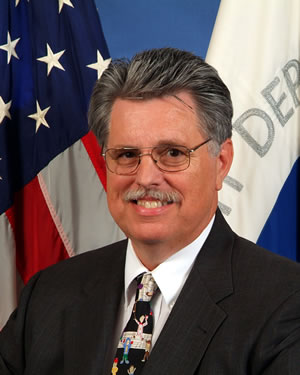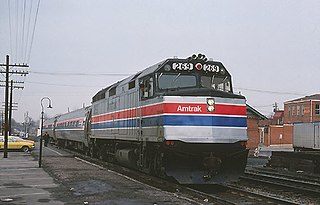Related Research Articles

The National Railroad Passenger Corporation, doing business as Amtrak, is the national passenger railroad company of the United States. It operates inter-city rail service in 46 of the 48 contiguous U.S. states and three Canadian provinces. Amtrak is a portmanteau of the words America and track.

The Northeast Corridor (NEC) is an electrified railroad line in the Northeast megalopolis of the United States. Owned primarily by Amtrak, it runs from Boston in the north to Washington, D.C., in the south, with major stops in Providence, New Haven, Stamford, New York City, Newark, Trenton, Philadelphia, Wilmington, and Baltimore. The NEC is roughly paralleled by Interstate 95 for most of its length. Carrying more than 2,200 trains a day, it is the busiest passenger rail line in the United States by ridership and service frequency.

The City of New Orleans is a long-distance passenger train operated by Amtrak in the Central United States between Chicago and New Orleans. The overnight train takes about 191⁄2 hours to complete its 934-mile (1,503 km) route, making major stops in Champaign–Urbana, Carbondale, Memphis, and Jackson as well as in other small towns.

The Cardinal is a long-distance passenger train operated by Amtrak between New York Penn Station and Chicago Union Station via Philadelphia, Washington, D.C., Charlottesville, Charleston, Huntington, Cincinnati, and Indianapolis. Along with the Capitol Limited and Lake Shore Limited, it is one of three trains linking the Northeast and Chicago. The 1,146-mile (1,844 km) trip between New York and Chicago is scheduled for 281⁄4 hours.

The Sunset Limited is a long-distance passenger train run by Amtrak, operating on a 1,995-mile (3,211 km) route between New Orleans and Los Angeles. Major stops include Houston, San Antonio and El Paso in Texas, as well as Tucson, Arizona. Opening in 1894 through the Southern Pacific Railroad, the Sunset Limited is the oldest continuously operating named train in the United States.

Commuter rail services in the United States, Canada, Cuba, Mexico, Panama, and Costa Rica provide common carrier passenger transportation along railway tracks, with scheduled service on fixed routes on a non-reservation basis, primarily for short-distance (local) travel between a central business district and adjacent suburbs and regional travel between cities of a conurbation. It does not include rapid transit or light rail service.

The North Coast Hiawatha was a long-distance passenger train operated by Amtrak between Chicago, Illinois, and Seattle, Washington.

The Iowa Interstate Railroad is a Class II regional railroad operating in the central United States. The railroad is owned by Railroad Development Corporation of Pittsburgh, Pennsylvania.

The EMD SDP40F is a six-axle 3,000 hp (2.2 MW) C-C diesel–electric locomotive built by General Motors Electro-Motive Division (EMD) from 1973 to 1974. Based on Santa Fe's EMD FP45, EMD built 150 for Amtrak, the operator of most intercity passenger trains in the United States. Amtrak, a private company but funded by the United States government, had begun operation in 1971 with a fleet of aging diesel locomotives inherited from various private railroads. The SDP40F was the first diesel locomotive built new for Amtrak and for a brief time they formed the backbone of the company's long-distance fleet.

The Pioneer was an Amtrak long-distance passenger train that ran between Seattle and Chicago via Portland, Boise, Salt Lake City, and Denver. Operating from 1977 to 1997, the Pioneer was the last passenger rail route to serve Wyoming, Southern Idaho, or Eastern Oregon.

The Floridian was a train operated by Amtrak from 1971 to 1979 that ran between Chicago and Florida, with two branches south of Jacksonville terminating at Miami and St. Petersburg. For its Nashville to Montgomery segment, its route followed that of several former Louisville & Nashville Railroad (L&N) passenger trains, including the Pan-American and the Humming Bird. Originating in Chicago, the train served Lafayette and Bloomington, Indiana; Louisville and Bowling Green, Kentucky; Nashville, Tennessee; Decatur, Birmingham, Montgomery and Dothan, Alabama; and Thomasville, Valdosta and Waycross, Georgia.

Amfleet is a fleet of single-level intercity railroad passenger cars built by the Budd Company for American company Amtrak in the late 1970s and early 1980s. Budd based the Amfleet design on its earlier Metroliner electric multiple unit. An initial order for 57 cars in 1973 to supplement the Metroliners on the Northeast Corridor grew to two orders totaling 642 cars, sufficient to reequip all the services on the Northeast Corridor and many other routes around the United States. The first 492 cars, known as Amfleet I and completed between 1975 and 1977, were designed for short-distance service. A second order of 150 cars, known as Amfleet II and completed between 1980 and 1983, were designed for long-distance service. They were the last intercity passenger cars built by Budd.
The Rail Passengers Association (RPA), formerly the National Association of Railroad Passengers (NARP), is the largest advocacy organization for rail passengers in the United States.

The Lone Star was an Amtrak passenger train that ran between Chicago and Houston, or Dallas via Kansas City, Wichita, Oklahoma City, and Fort Worth. The train was renamed from the Texas Chief, which the Atchison, Topeka and Santa Fe Railway had introduced in 1948. Amtrak discontinued the Lone Star in 1979.

Yuma station is an Amtrak station at 281 South Gila Street in Yuma, Arizona, United States. Passenger rail service is provided thrice-weekly in each direction by the Sunset Limited and the Texas Eagle over this portion of its route. The station's island platform, which is adjacent to the station building site, are accessible through a short pedestrian tunnel.

Joseph Houston Boardman was an American transportation executive.

The Shenandoah was a daily passenger train operated by Amtrak between Washington and Cincinnati from 1976 until 1981.

The Mountaineer was a passenger train operated by Amtrak between Norfolk, Virginia, and Chicago, Illinois, via Cincinnati, Ohio. It was the first train to use the Norfolk and Western Railway's tracks since the creation of Amtrak in 1971 and followed the route of the Pocahontas, the N&W's last passenger train. Service began in 1975 and ended in 1977. A new train, the Hilltopper, operated over much of the Mountaineer's route but was itself discontinued in 1979.

The Borealis, referred to as Twin Cities–Milwaukee–Chicago (TCMC) during planning, is an Amtrak inter-city rail service that operates daily between Chicago, Illinois, and Saint Paul, Minnesota, via Milwaukee, Wisconsin. Service began on May 21, 2024, under the Amtrak Midwest brand.
William Walter Hay (1908–1998) was an American civil engineer and professor remembered with the annual American Railway Engineering and Maintenance-of-Way Association (AREMA) Hay Award recognizing outstanding achievements in railway engineering.
References
- ↑ "Library of Congress Authorities" . Retrieved 2025-01-01.
- ↑ Who's Who in Railroading and Rail Transit, 18th ed.(1977), p. 169
- ↑ "Arizona Rail Passenger Association director biographies". 1998. Archived from the original on 2007-11-11. Retrieved 2008-10-18.
- ↑ Todd Fandell, "Profile: Amtrak pick a rail buff", Chicago Tribune, 24 October 1977, sec. 6, p. 9
- ↑ "Haswell Nomination Killed", Burlington Free Press, 4 May 1978, p. 10
- ↑ Keefe, Kevin P. (May 20, 2024). "Remembering passenger train crusader Tony Haswell". Trains .